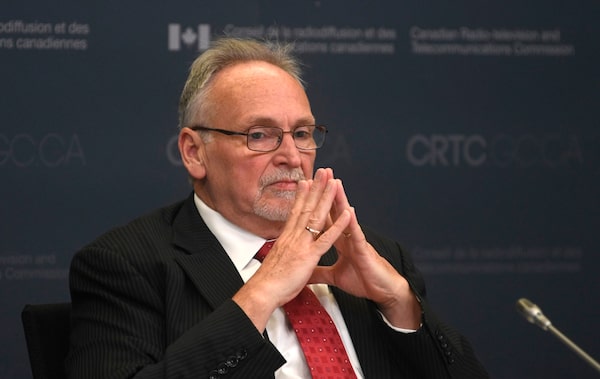
Achieving the CRTC’s speed targets 'may be the smallest obstacle to overcome,' CRTC chairman Ian Scott, seen here in Gatineau, Que., on Feb. 18, 2020, said.Adrian Wyld/The Canadian Press
The chairman of Canada’s telecom regulator says that ensuring residents in rural and remote areas have access to high-quality internet service, unlimited data and multiple providers may be a greater challenge than meeting the regulator’s broadband speed objectives.
The Canadian Radio-television and Telecommunications Commission has set a goal of ensuring that internet speeds of at least 50 megabits per second (Mbps) for downloads and 10 Mbps for uploads are available to 90 per cent of Canadian homes and businesses by the end of 2021. Currently, 85.7 per cent of Canadians have access to these speeds, although that number drops to 40.8 per cent in rural communities, according to CRTC data.
Various federal and provincial government initiatives are under way aimed at closing this gap, and the CRTC administers a fund that will pay out $750-million over five years to build out networks in underserved areas. In August, the regulator announced the first batch of projects it will fund, which will help connect more than 10,000 households in northern Manitoba, Yukon and the Northwest Territories. The bulk of the $72-million doled out in this first financing round will go to BCE Inc. subsidiary Northwestel Inc.
However, achieving the CRTC’s speed targets “may be the smallest obstacle to overcome,” CRTC chairman Ian Scott said during the virtual 2020 Canadian ISP Summit on Tuesday.
"Ensuring Canada’s less well-served communities have access to unlimited data packages, competition from a number of service providers, and high-quality service may prove to be even greater challenges.”
But consumer-rights advocate Laura Tribe said that the CRTC’s speed objectives still seem “far from possible” for many rural and remote communities.
“Due to the CRTC and federal government’s failures to introduce more competition, adequate affordability mechanisms, or sufficiently produce a national broadband strategy, it appears that Canada’s remote communities are going to have to wait for some time before they see any of the priorities the CRTC chair highlighted today,” said Ms. Tribe, executive director of OpenMedia, an organization advocating for widespread inexpensive internet access.
Mr. Scott’s comments come one day after the regulator launched a public consultation, inviting Canadians who live in the North to give feedback on the telecom services that they receive, particularly from Northwestel, which is a major player in Nunavut, Yukon, Northwest Territories, northern Alberta and northern British Columbia.
A spokesperson for Northwestel said the company is committed to improving telecom services in northern Canada and looks forward to participating in the review. “While the review is under way, Northwestel will continue its significant investments in improving connections in the North,” Andrew Anderson said in an e-mail, citing a number of continuing projects, including one that will make Yukon and the Northwest Territories “among the most connected jurisdictions in Canada.”
The CRTC said it is looking for comments on affordability, service quality (including speeds, coverage and how reliable the service is) and suggestions for fostering greater competition in the northern part of the country. Submissions are due by Jan. 20, 2021.
Mr. Scott said the pandemic – which has exacerbated the digital divide between urban and rural regions of the country – prompted the regulator to take a closer look at telecom services in the North.
“Those living in Canada’s North have far fewer choices of telecommunications service providers than those of us elsewhere," Mr. Scott said, adding that residents in the North “almost always” pay higher prices and don’t have access to the internet speeds that the regulator is targeting.
Mr. Scott also encouraged smaller internet service providers (ISPs) to abide by a code of conduct implemented this past January. The CRTC’s internet code – which seeks to protect consumers by making contracts easier to understand and pricing more clear – is aimed at the country’s largest internet providers, but Mr. Scott said Tuesday that the CRTC expects smaller providers to follow the same rules.
“Some of you already are, and I applaud you for that. But for those that are not, I urge you to follow suit. After all, it’s for the benefit of your customers and your business,” Mr. Scott said.
Your time is valuable. Have the Top Business Headlines newsletter conveniently delivered to your inbox in the morning or evening. Sign up today.
 Alexandra Posadzki
Alexandra Posadzki